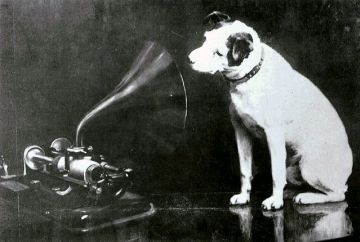 HMV’s pooch has been put down. Staring into a rifle rather than a gramophone, Nipper’s one of the latest goners in the struggling high street. The question is just why exactly he and the chain have taken this long to croak.
HMV’s pooch has been put down. Staring into a rifle rather than a gramophone, Nipper’s one of the latest goners in the struggling high street. The question is just why exactly he and the chain have taken this long to croak.
His Master’s Voice had been shouting – with a sickly sore throat – for quite some time about how it is still relevant. HMV tried to launch a digital on-demand service, it committed more of its shelf space to electronics, and attempted to lift itself out of an inevitable quagmire. All the nostalgia is fair enough considering the brand’s longstanding legacy (though this Telegraph article makes a compelling case otherwise) – what doesn’t make sense is the illogical idea that Britain’s high street is integral to its national character or even its larger economy. Britain went through the luddite movement once already. Haven’t we learned our lesson? Once the technology is out there, you can’t turn back the clock, and trying to do so is understandable, but stupid.
Shopping online makes sense. This is why it is so successful. Given the choice between getting on a bus, standing in a queue, paying more, and with a limited selection – compared to one click ordering in under a minute, cheap, for exactly what you want or need – is it any surprise the consumer has largely chosen the web? It is possible that a retailer will figure out a hybrid model at some point in the future, and bargain or pound shops are unlikely to have many problems in a recession, but for the sort of commodities that don’t need to be tried on, the internet is a better option.
Any sympathies in wake of the bust must be directed toward the thousands of staff that lost their jobs because management refused to innovate in an age where taking risks and doing so is the only way to succeed. Consistently playing catch-up, and thoroughly outpaced, it is a miracle HMV managed to hold on as long as it did. As for the unfortunate staff: let the demise of HMV, and all the others, work as a warning that in a permanently connected society it’s now nearly impossible to rest on your laurels and run a successful operation. HMV, of course, is only one of the most recent. Jessops (which previously shared the same chief executive as HMV’s last) was another casualty, before it, Comet, and before that, more. It has just been announced that Blockbuster will go into administration – South Park aired an episode about the inevitability of this outcome in October 2012.
Britain’s high street hasn’t been about some vague and nostalgic notion of community for a long time. Its steady transformation from local merchants and butchers to identikit hubs of big brand shops, that look the same in every British suburb, was complete years ago.
Adam Smith described Britain as a nation of shopkeepers, and that – first published in 1776 – is still true today. But it is something that must change. The high street’s death rattle has only just begun. An economy committed to hiring people to sell products – let alone barely producing – is bound to fail, and we can only expect more casualties to come.
According to some critics, the blame is solely in the hands of management. Speaking with ChannelEye, Luke Ireland, business strategy adviser and non-executive director, said: “It is no surprise that we see three more major retailers succumb to the power of the internet.
“Don’t blame tax avoidance or government policy blame the management for not embracing the internet.
“It’s not going away and unless you fundamentally build it into everything you do your business will fail. I feel for the staff but if you work for a retail business which ignores the internet I’d look for another job.”
 HMV and Blockbuster are gone, along with countless independent shops, but their demise doesn’t appear to be hurting video game distributors. In fact, the leading UK distributors told MCV that the closures did not have much of an impact at all.
HMV and Blockbuster are gone, along with countless independent shops, but their demise doesn’t appear to be hurting video game distributors. In fact, the leading UK distributors told MCV that the closures did not have much of an impact at all.






